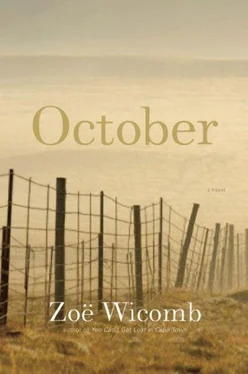Mercia spent four days on her own at the coast. She could not help sketching out different scenarios. If they had had children, would Craig have left? Would he not have had a fling and returned to the fold? She wept for the shame of it: yes, she would have endured that, would abjectly have put up with it. Which led to the conclusion that she had been right about not having children.
Things will get better, are already better, she consoled herself. Spring will do the trick, even if in these parts summer held off indefinitely. Already bluebells burst in waves of blue in the woods, and gorse crowded the path in a sea of bright yellow, hiding its thorns, the honeyed coconut smell hovering above the brine. The clichés of the countryside sprang into life, with lambs gamboling on brand-new legs, yes, actually leaping joyfully in the reluctant sunlight.
Just you keep it up, this friskiness, for soon you’ll be slaughtered, Mercia muttered. She wondered at what stage a gamboling lamb became an edible lamb. At least she was brought up to eat mutton, full-grown sheep, rather than babies caught in joyful midair leap.
The coast had also been a means of escaping Jake’s letter. Emptied by grief, Mercia had so little to give. Was she not the one in need of comfort? The impossible flashed before her: an older, fictional brother who would touch the top of her head with four fingers, stroke her nape with his thumb, and take her home.
Jake’s letter was no doubt written in the early hours, in a struggle with insomnia, with a hangover perhaps, when things get distorted. In which case it was kinder to ignore it. A nuisance that in this day and age Jake did not have e-mail, not since he returned to Kliprand. For all the hastiness of his scribble, for all the desire he might have had to fish the letter back out of the pillar box, here on the coast it turned into an arrow pointing home. His request was preposterous, and she had no intention of making any reference to the child, but she would have to respond.
Back home in Glasgow, she telephoned. It was Sylvie who answered. Everything was fine, she said in her emphatic voice. Jake was not there, was at Aspoester’s, the new bar, but she would tell him of Mercia’s plans to visit. Later in the year, in spring, would be a better time to come. When the Namaqua daisies were out.
Did Sylvie not know of Jake’s letter?
It is day two and still no Jake. Of course, he is there, in the sagging bed, in the room with curtains drawn. Mercia has heard him in the night stumbling to the lavatory, then the slam of the fridge door, but during the day he lies low in the dark, fetid lair and ignores any attempt to rouse him. Sylvie sneaks in to feed the monster, carries in mugs of sweet black coffee and the occasional bread with peanut butter which he may or may not eat.
Mercia is furious. It was not at all convenient to come at this stage, and Jake could surely have written or telephoned to say that he has changed his mind, that he does not want to see her, even if such a cry for help is indelible. She does not know what to make of the claim that he is too ill to speak to her. Jake has always been difficult, contrary, has delighted in being the good-for-nothing villain, but his villainy had been directed at their father. With her, Mercia, he had always been gentle, had appointed for himself a place in her heart, had wanted her approval.
In the old house built of clay bricks baked in the sun on the riverbank, the children shared a bedroom. Mercia longed for a room of her own, but Jake was content; he believed that he would not be able to sleep without her. It could not have been beyond their parents’ means to add a room, but their father had in mind a grand future for his children, and to that purpose they were to make sacrifices and lead frugal lives.
Sometimes, on winter nights, after the animals were tended and the supper dishes were cleared, Father grew less stern and read to them from the abridged Dickens novels that Mercia loved and did not mind hearing again and again. She traced with her finger the line drawings of Miss Murdstone’s wicked face, of hungry Oliver, and Pip as a young gentleman. Oh, it was Pip with whom she identified — his betrayal of Joe quite overlooked — Pip who escaped to a grand life in London. Miss Havisham too was captivating, also in the drawing where she presided, tall, dignified, imperious in her moth-eaten frock, over a magnificent crumbling cake. The table was laden with unidentifiable dishes, but unmistakably grand and bounteous, bound together as they were with the gossamer of spiderwebs. Mercia would practice their words in many fancy voices: Please, sir, I want some more; Barkis is willing; Play, boy, play.
There was also the Children’s Bible and the magic of Moses’s bush that burned and was not consumed. In grave tones she repeated over and over God’s words to Moses, I am who I am, for they were regularly tested on the wonderful stories from the Old Testament. In the light of the paraffin lamp and with coals glowing in the pan, God’s strange message, “Tell the people of Israel I am has sent me to you,” was doubly mysterious. Their father said that God’s words were not to be questioned.
Mercia does not remember Jake enjoying the stories. He sat stiffly, on the edge of his chair, as if bracing himself for an unexpected blow. In a sense he was right: there never was any knowing how they might trespass, do or say something wrong; they lived in a state of perpetual fear and guilt. But she, Mercia, transported by stories, was prepared to take the evening’s suspension of harsh parenthood at face value. Fagin’s den grew right there in the shadowy corner of the kitchen where the paraffin flame darkened the glass; Nancy’s faded frock rustled; and Sikes’s dog barked ominously in the distance.
At night when their candle had to be snuffed as soon as they were in bed, Mercia listened in fear to the distant barking of real dogs. Or worried about the church bell, which rang in the night when someone died. Then she was pleased to hear Jake muttering in his sleep. She believed the bell to ring all by itself, or rather be rung by a fierce bearded God, far fiercer than Father, who glowered through the corrugated zinc roof, and she would hide in vain under the covers as he thundered his demands like any common robber.
Guilt — that was what defined their childhood. Guilt ran like a dye through their days, streaking the most innocent of activities, tingeing all with fear of trespassing and disappointing their virtuous parents. Were there no golden days of childhood, no forgotten walks through parables of sunlight, when after rare rain they scampered about in a fresh, new world? Jake was emphatic. No, never, that Mercia was mistaken.
But Mercia, who fashioned her own private world, remembers otherwise. On lovely days cooled with cloud, she stepped out of the real to play alone at her secret place, a thornbush decorated with the silver paper rescued from Christmas sweets. In spring tiny green leaves burst from the gray stems, and later, at the end of summer, red berries shone as brightly as the silver paper. With twigs she swept a clearing around the bush, and there, hidden in an embankment, escaped from them all, even from Jake, whom she did not tell of that home.
Mercia had stolen a cracked inkwell from school so that she could cradle in her hand its exquisite shape, the clean lines of white porcelain that tapered to the base, and at its mouth the curve of the rim, rounded to fit a slot in the school desk. She had washed the well clean of ink and kept it hidden in her thornbush home. Never again would it be an object for use, no, from that day she renamed it a vase. Mercia did not mind the crack at all, as she placed in it a sprig of flowering Jan Twakkie. Her collection of stones was kept in a special oval tin that once contained canned fish. Father had hammered the edges down smoothly, so that she would run her fingers around the rim, marveling at the lack of corners, the lovely shape with its matching name: oval.
Читать дальше












